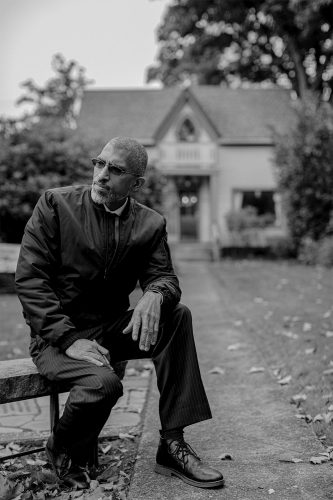
The first thing Eric Richardson wants to make clear is that he is doing fine, thank you.
“I’m doing good. I’m very fortunate as an African American male,” he says, noting his strong family ties in Eugene as well as the outpouring of support among the countless contacts he’s made over the years with nonprofit organizations in Lane County, first as the president, then the executive director, of the Eugene Springfield NAACP Unit 1119.
Richardson’s nine-year tenure with the NAACP came to an abrupt end on Nov. 29 last year when the local board voted to dismiss him. While Board Vice President Adam Wendt noted to Eugene Weekly on Nov. 30 that “Eric’s fucking amazing,” and that “we hope he stays involved with the unit,” the board had decided to seek an executive director with a different skill set.
“It was a difficult time, yes,” Richardson admits, since it was close to the holiday season, and the announcement caught people off guard. Many wrote moving tributes to him on social media, some laced with anger at the dismissal, and Richardson says roughly 80 people signed a letter of protest to the NAACP’s regional and national offices.
“I wasn’t the one who spearheaded it,” Richardson emphasizes, but he didn’t stand in the way of the protest effort, either. Richardson says he let the system play out knowing that the national office oversees more than 900 branches throughout the country, and he didn’t believe his dismissal rose to the level of closer scrutiny.
It didn’t, and now Richardson says, “It’s done. Let’s move on. There’s work to be done.”
As part of that work, the 53-year-old Richardson will host a gathering Feb. 19 at WOW Hall. “Reflections on Nine Years with the NAACP” is the title of his remarks, and he will talk about Oregon’s path forward in the age of demographic change as well as civics in the 21st century.
But this is Eric Richardson, so there also will be jazz music into the early evening.
Expect Richardson to break out the double bass, which seems to be everywhere he is. That will serve as a warmup to the Joe Manis Quartet, headlined by Manis, the Lane County native who is a saxophonist and a jazz staple in the Pacific Northwest. Manis and his group will play from John Coltrane’s legendary album, A Supreme Love. Richardson notes that he has followed Manis for the past five years and admires his work on stage and his teaching.
Richardson is also hosting “Black Is — A Supreme Love” on KEPW, 97.3 FM, every Sunday afternoon in February, Black History Month. It’s a tribute to Coltrane’s famous 1964 album and other great jazz music that shaped Richardson’s boyhood in St. Louis.
“I was raised around this great music,” he says, and he will preach about the joy of jazz any chance he can, adding that “like the NAACP, it has been underutilized.”
For his part, Manis is happy to play Feb. 19, especially Coltrane’s masterpiece work on what many consider the greatest jazz album of all time.
“For me personally, Coltrane’s period with this quartet has been central to my musical development,” Manis says. “The power of his sound and the character of his playing are some of my deepest influences as a musician. So I’m really honored that Eric asked me to participate in this event, performing this work.”
After the event it’s back to work for Richardson, helping to form partnerships and relationships in public institutions as he always has. The work — the drive, especially in education — doesn’t end because he’s no longer affiliated with the NAACP.
“It’s not about me,” he says. “It’s about policies that can facilitate change.”
Central to his work is building relationships with public schools to take a stand on morals and civics, especially in the backdrop of this society’s ever-changing demographics. “This is meaningful work,” he says. “Civics and morals are related.”
Richardson also has been touting college scholarship opportunities for Black students with the Oregon Alliance of Black School Educators (ORABSE.org).
What you won’t hear from Richardson is any ill will directed at the board who dismissed him. He noted at the time of his dismissal that he foresaw this happening and that he had to respect a strong board’s right to dismiss its leader.
It was, he says, a good ride in a community he loves.
“I saw this as a way of serving,” he says. “I never saw it as a job.”
So look for Eric Richardson to continue serving — with a jazz beat.
A social gathering and a talk by Eric Richardson — “Reflections on Nine Years with the NAACP” — is 4 pm to 7 pm Saturday, Feb. 19 at WOW Hall, 291 W. 8th Avenue. Music will be performed by Richardson and the Joe Manis Quartet. $10.
Richardson is hosting “Black Is — A Love Supreme,” featuring John Coltrane and other jazz music that celebrates Black culture every Sunday through the end of February, Black History Month, noon to 1:30 pm, KEPW, 97.3 FM and KEPW.org.
Help keep truly independent
local news alive!
As the year wraps up, we’re reminded — again — that independent local news doesn’t just magically appear. It exists because this community insists on having a watchdog, a megaphone and occasionally a thorn in someone’s side.
Over the past two years, you helped us regroup and get back to doing what we do best: reporting with heart, backbone, and zero corporate nonsense.
If you want to keep Eugene Weekly free and fearless… this is the moment.